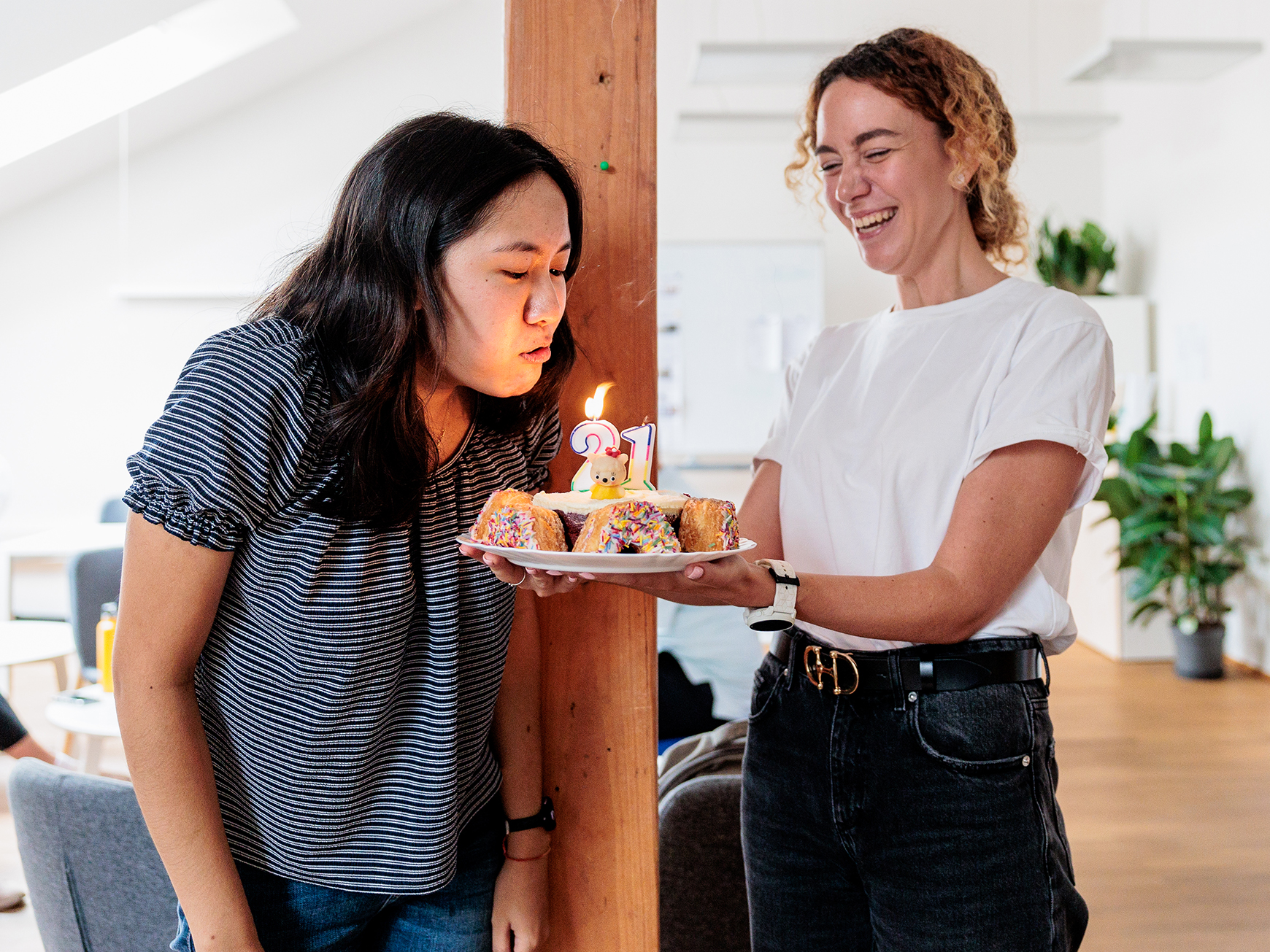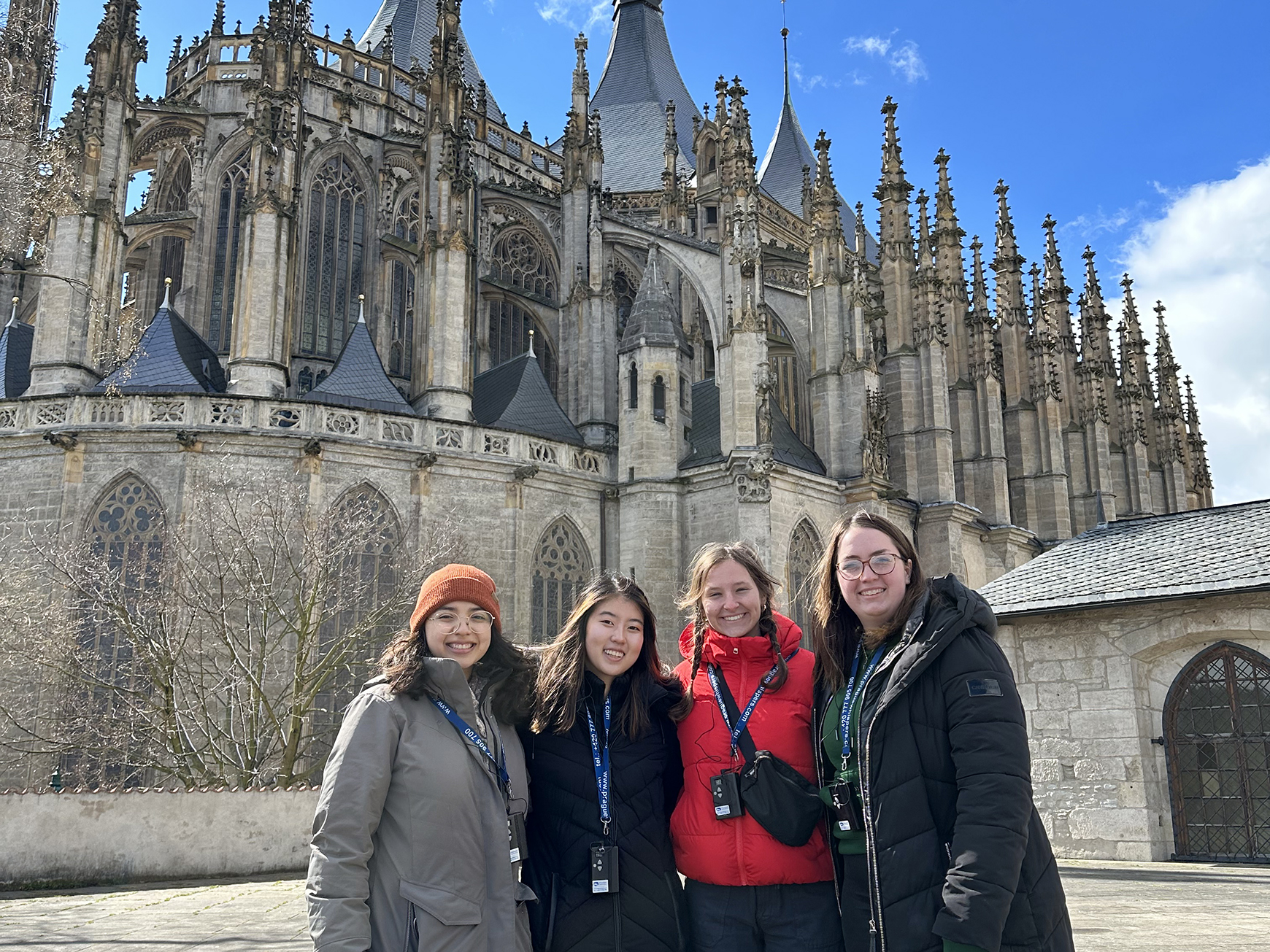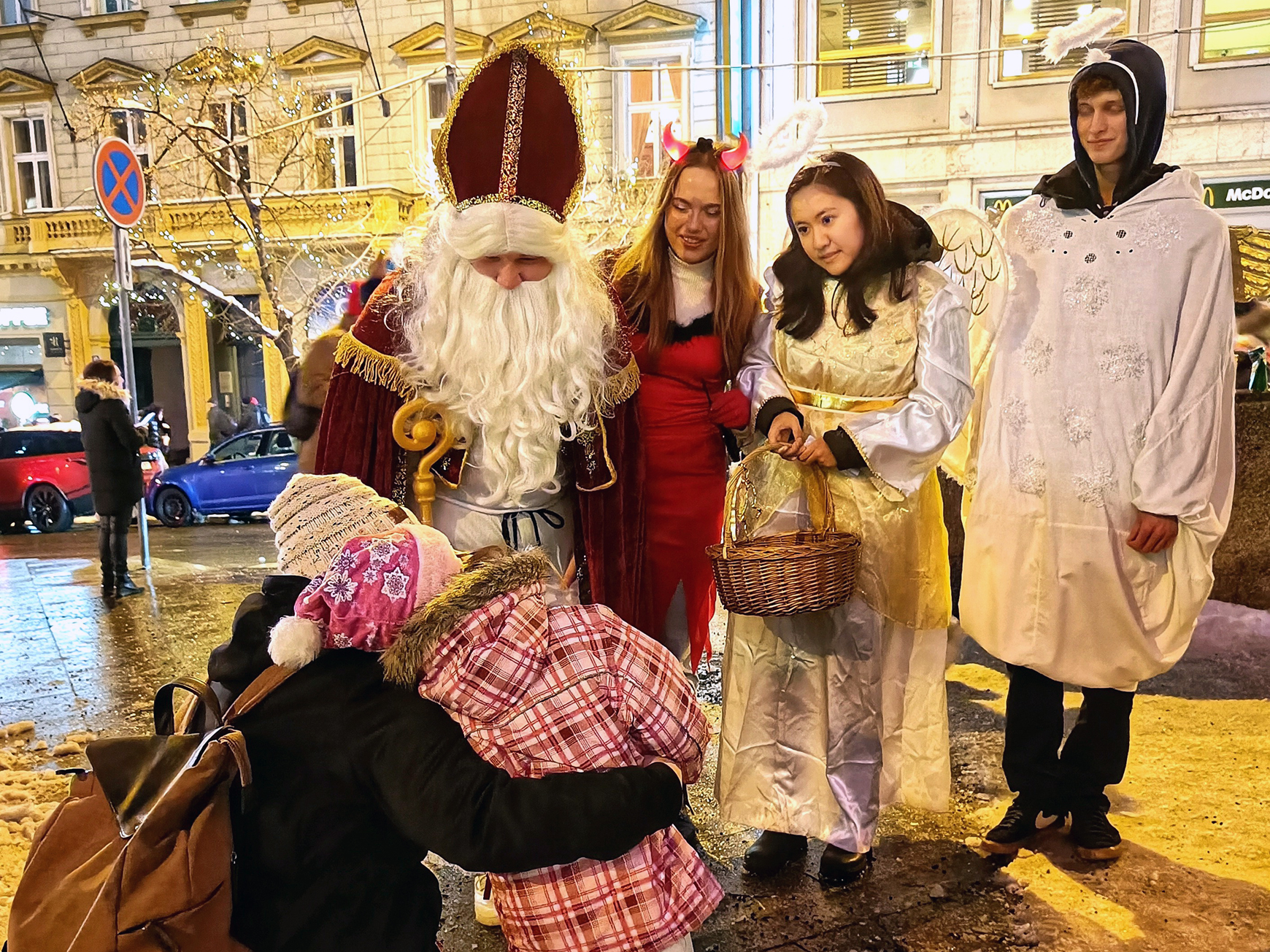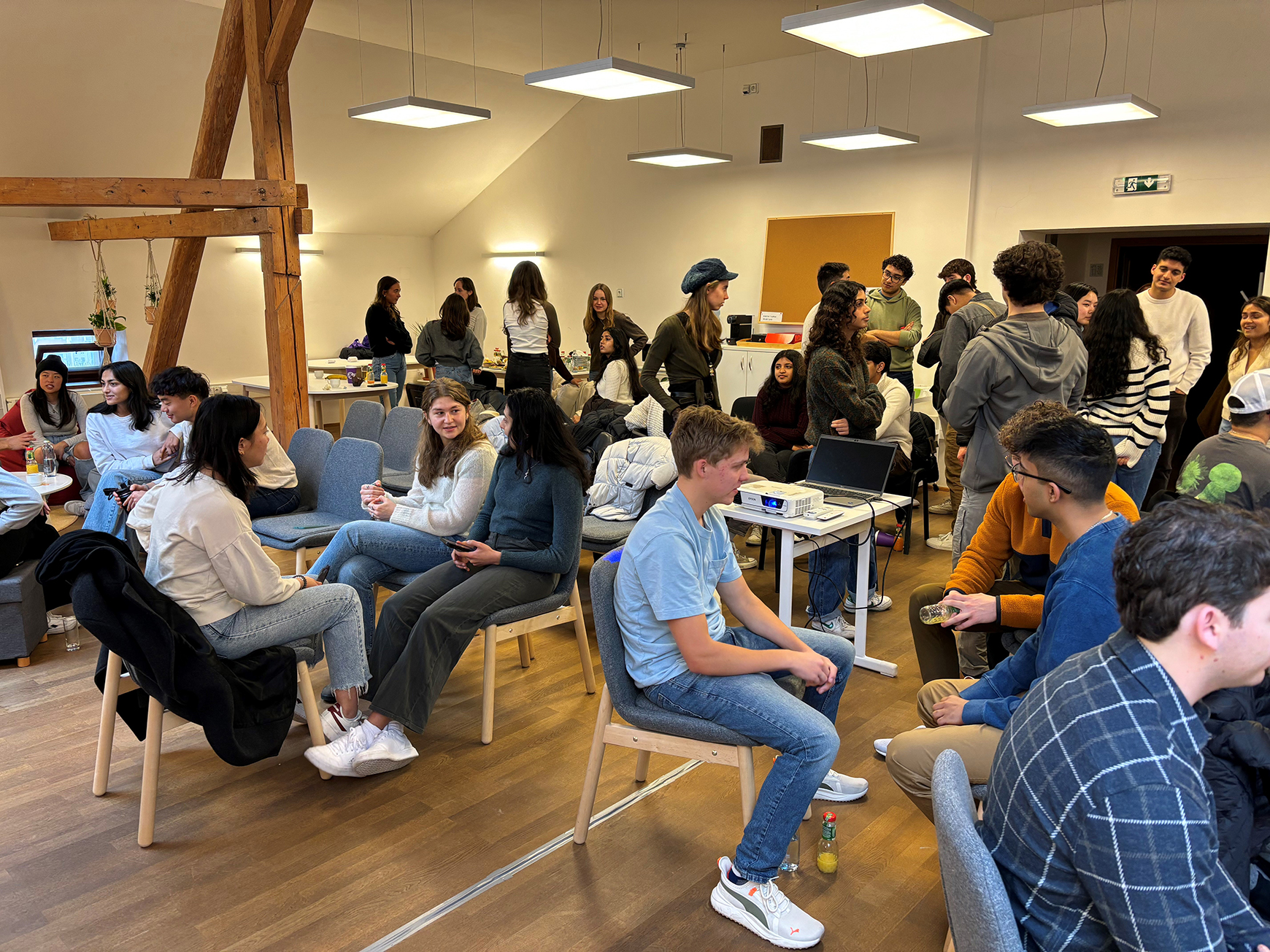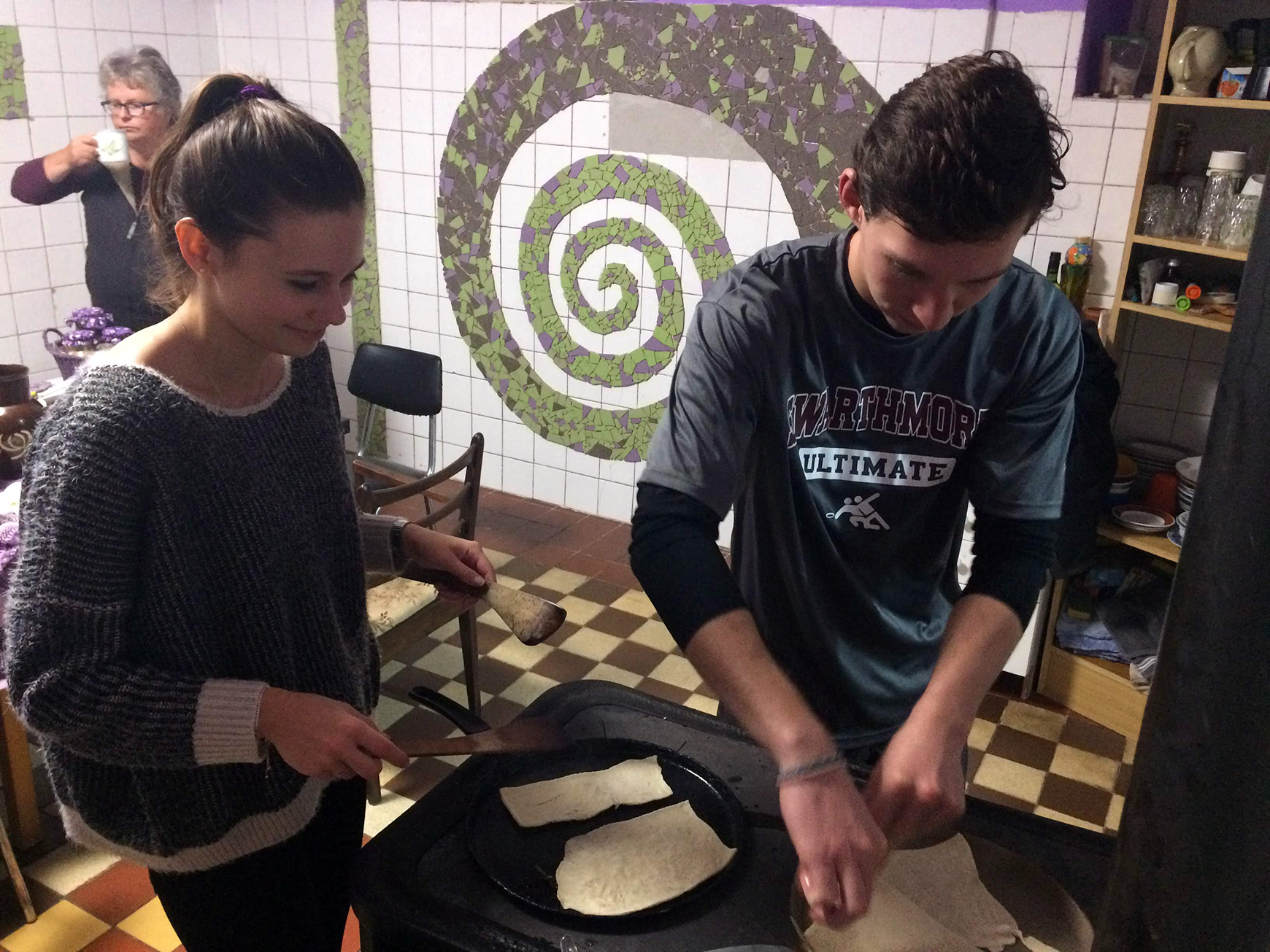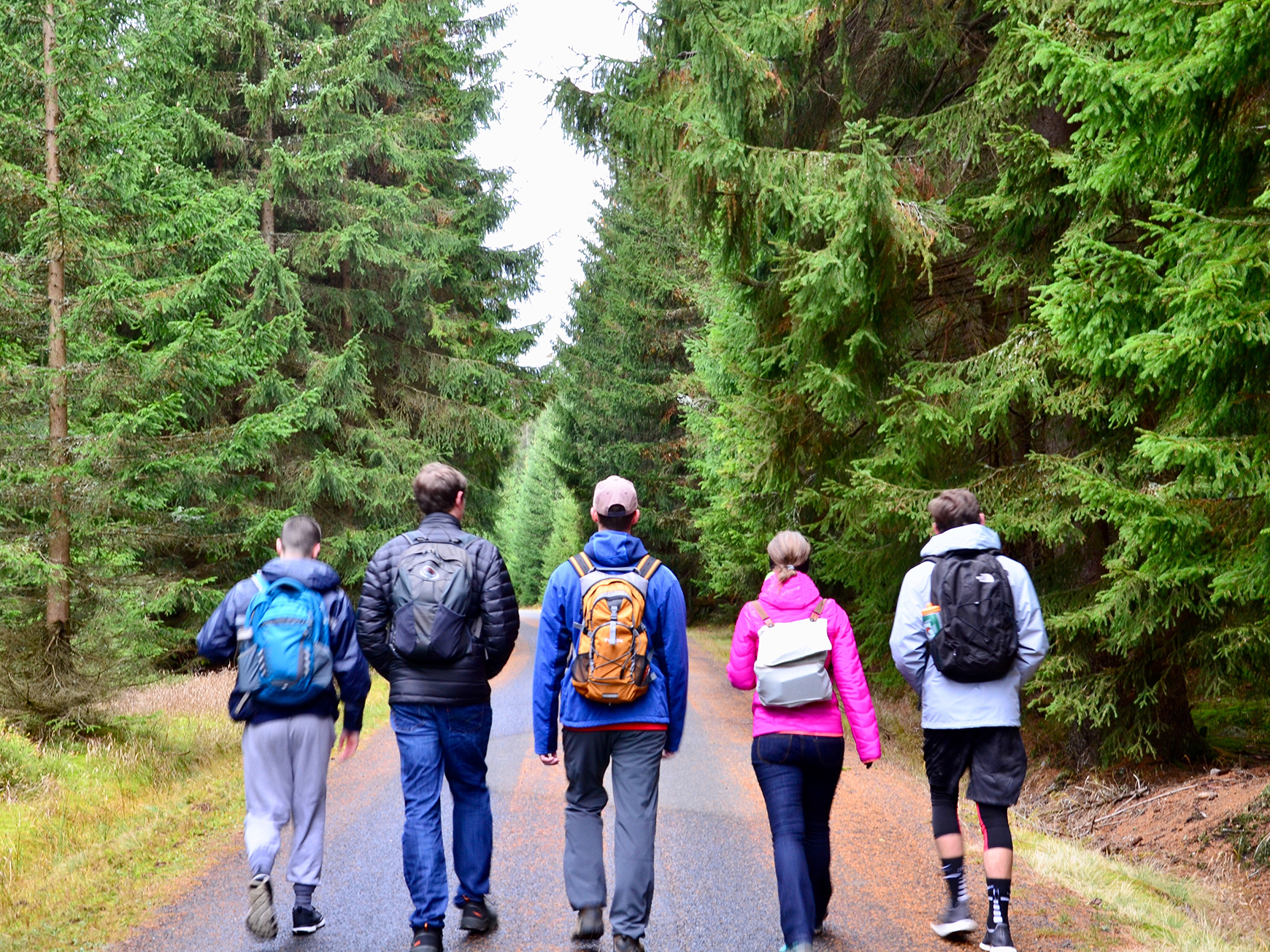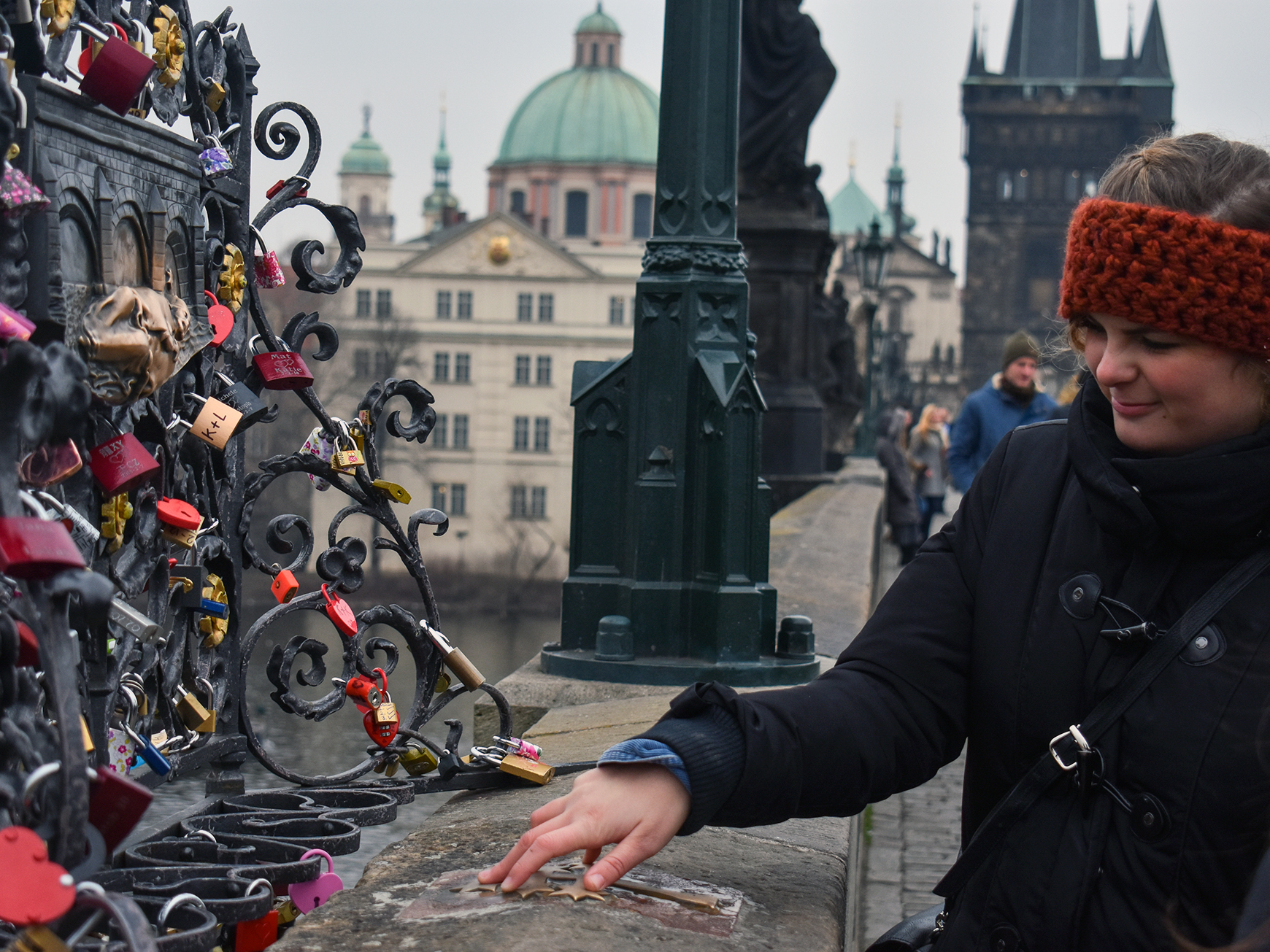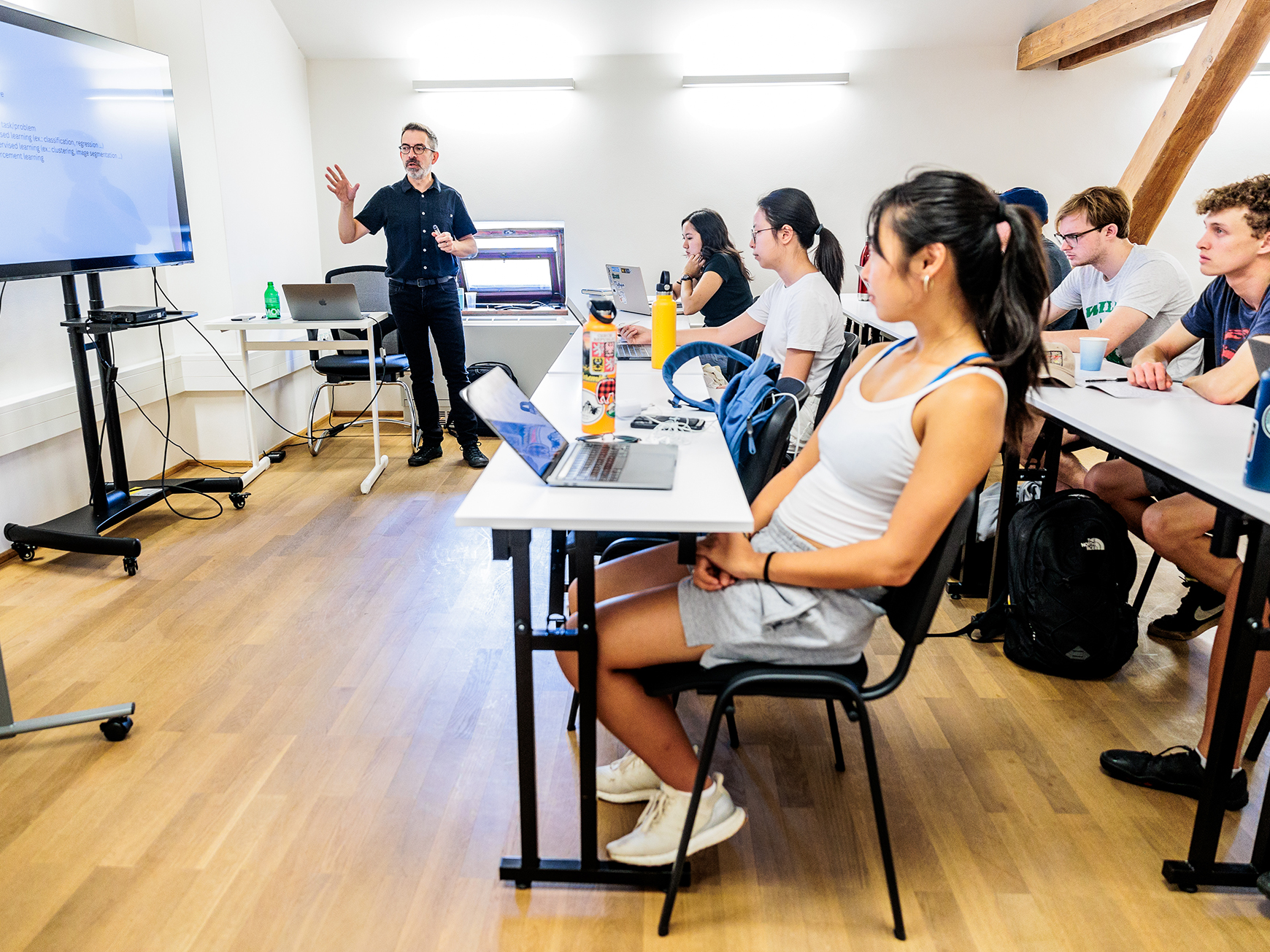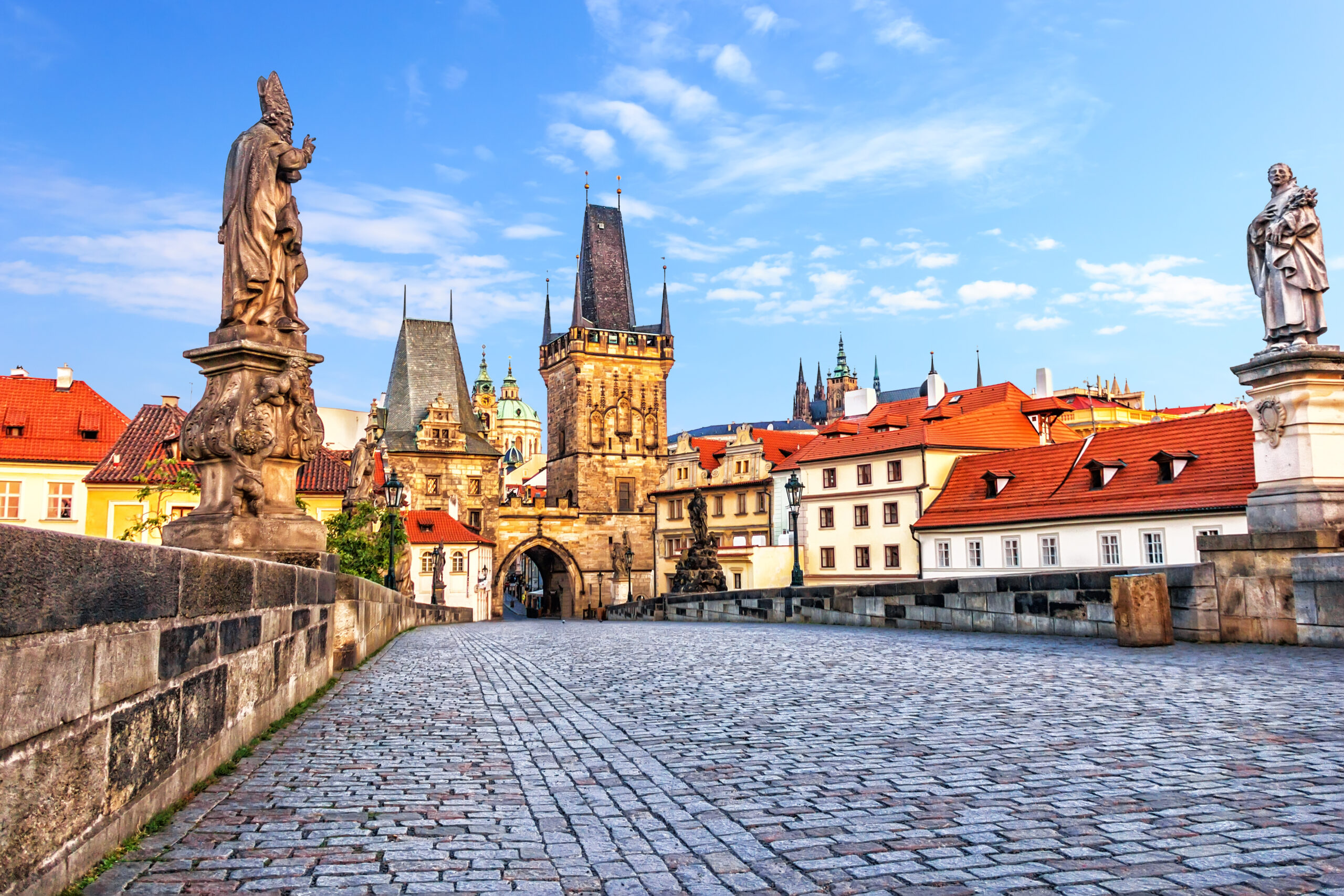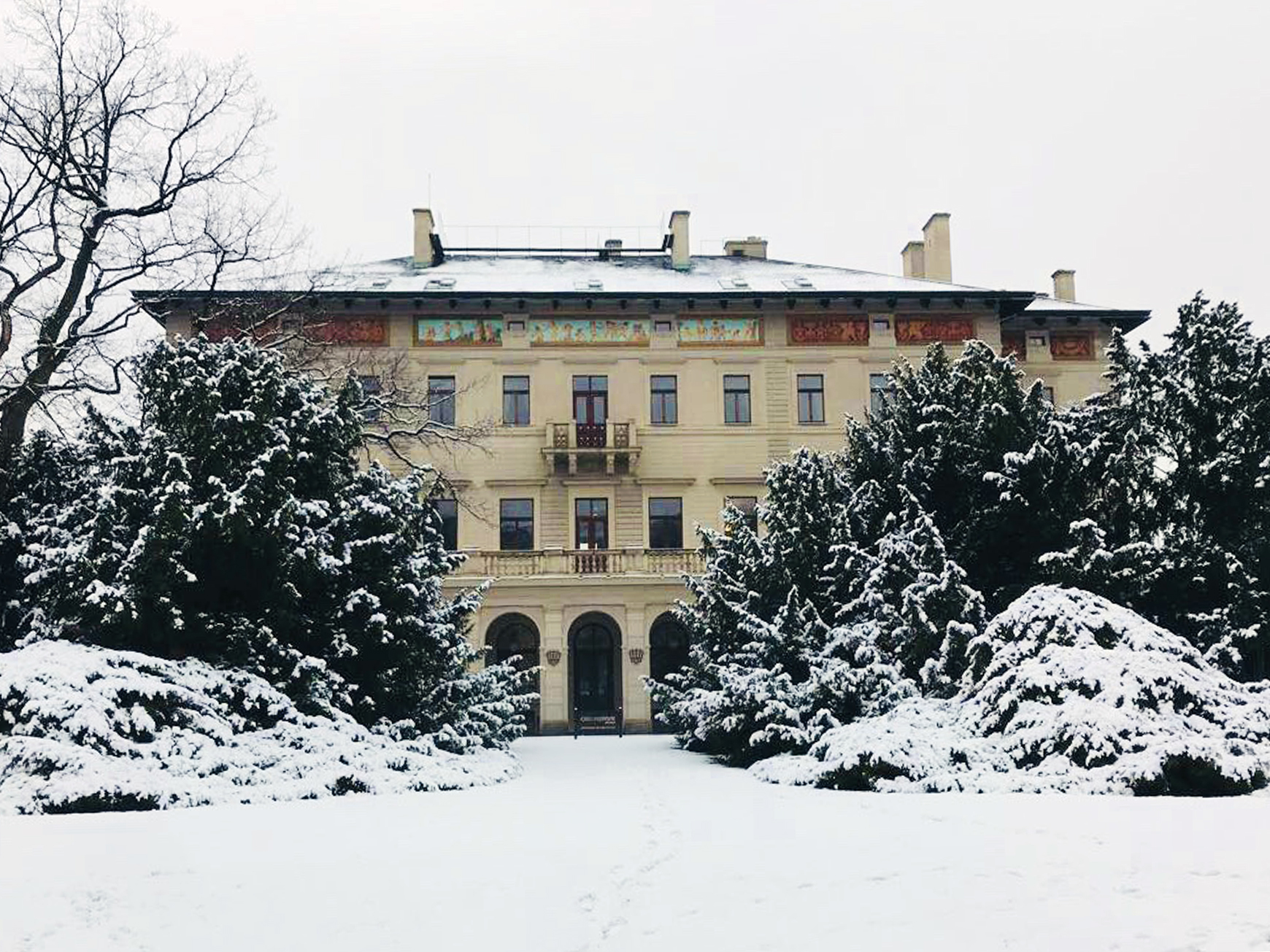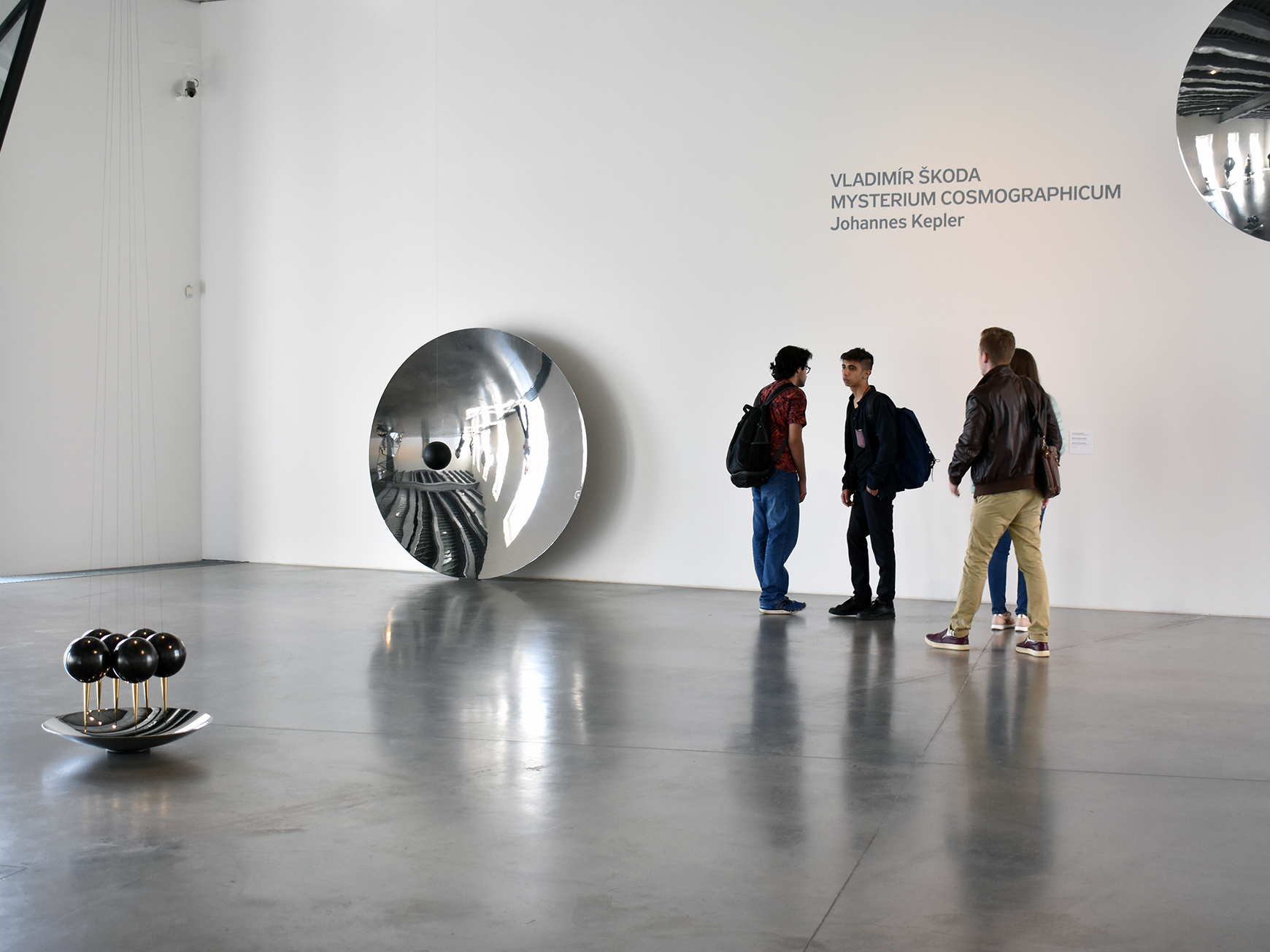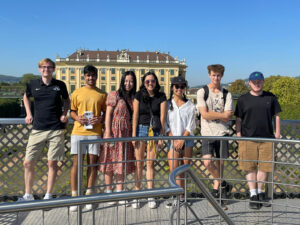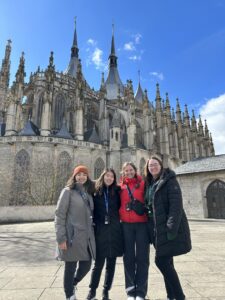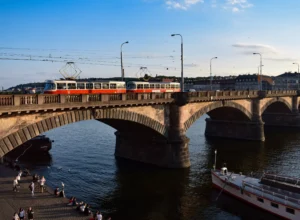Prague, Czech Republic
IFSA Study in Prague
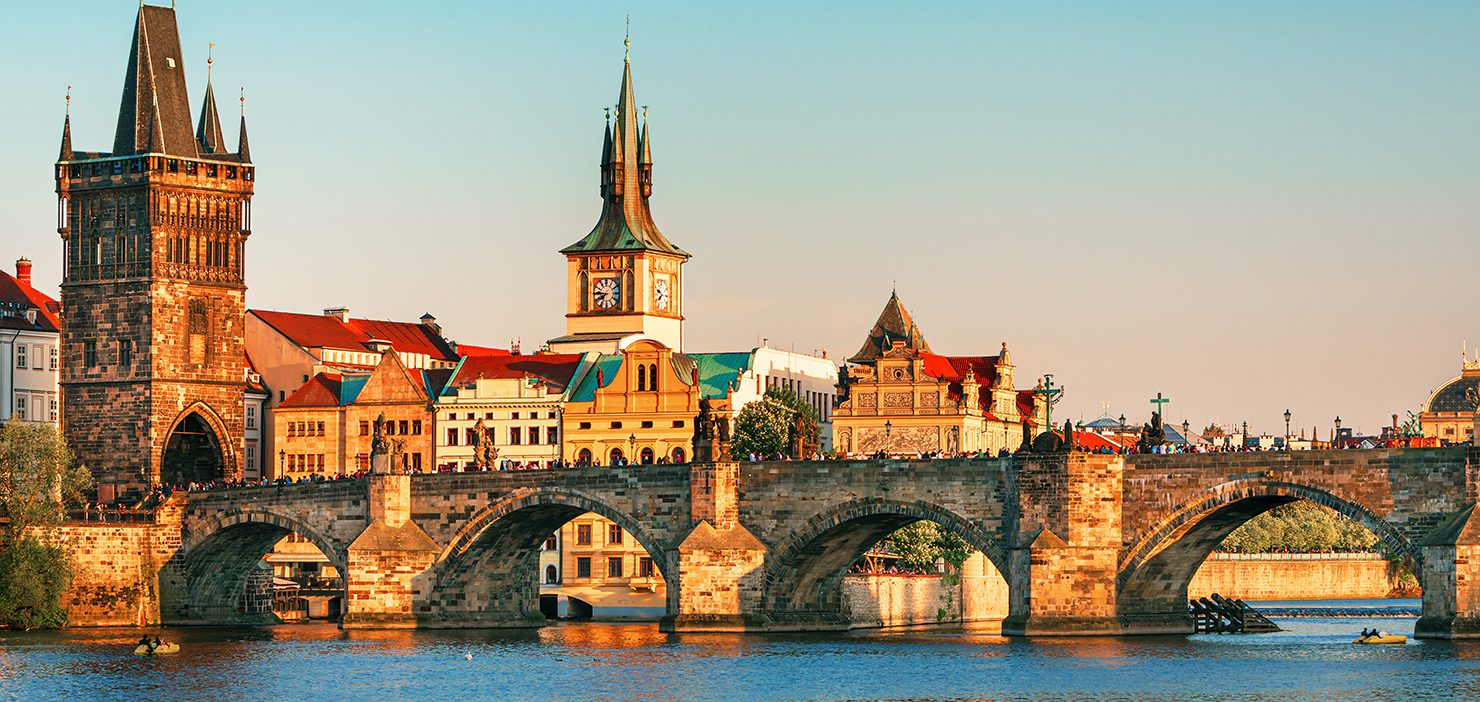

Program Overview
AFFORDABILITY + ACADEMIC OPTIONS
Good news! You’ve just found your ticket to a memorable European experience that fits your budget. In Prague, you’ll delve into communication, digital marketing, data science, computer science, architecture, Czech language, and more with IFSA classes at historic Villa Grébovka in the heart of the city. Plus, opt to take a class at Charles University, the country’s top-ranked university.
Discussions come to life through authentic connections with Czech people via meetups, meals, excursions, internships, and more. After class, head to a café with friends to savor chlebíčky—open-faced sandwiches—or explore the city’s many wonders, including quaint Old Town, the 11th century castle, Vyšehrad, and David Černý’s street art.
This is an exclusive IFSA-Designed Program. Learn more about these affordable programs here.
Application Date: If you are not a citizen of the U.S. or the EU, you must apply by the earlier published application date in order to have enough time to apply for a visa.
Details at a Glance
Application deadline
Minimum GPA
2.00
Credit load
12–16
Housing
Apartment/Flat, Single Room Option
Instruction language
English
Language prerequisites
None
Visa required?
Yes. Learn more.
Academics
Build your own curriculum with a combination of 4–5 IFSA classes. You may opt to take one local university class offered by Charles University for a supplemental fee.
CHART Your Course
Find the classes you need fast with CHART. Our easy-to-use tool shows you classes recently taken by IFSA students.
IFSA ELECTIVE CLASSES
Classes are open to all students without prerequisites. Not all classes may be offered in a given semester. Click on each link below for a detailed class syllabus.
Arts and Humanities
AI, Social Identity and Ethics
This class explores the intersection of artificial intelligence, social identity, and ethics in a global context. As AI continues to shape industries, societies, and personal lives, it increasingly raises ethical questions about bias, privacy, and the social implications of technology. Students will critically analyze how AI systems impact marginalized communities, influence social identities, and either perpetuate or dismantle inequality. By studying the ethical frameworks and real-world applications of AI in a diverse and international setting, students will gain a deep understanding of the social responsibilities associated with the design and use of AI technologies. This class is ideal for students interested in technology, ethics, social justice, and global perspectives on innovation. (3 U.S. semester credit hours)
Architecture and Design in Prague
The class introduces the European artistic architecture and design of the Czech capital. By examining artists, architects, and their works, students acquire a deeper understanding of the city’s character and how patronage, power, and politics have shaped the urban landscape. The class covers the periods of European architectural development from medieval to modern, distinguishing the various artistic styles and movements; the ways in which architects and designers conform to, or disrupt, artistic conventions; and how their work reflects and even influences the social and political dynamics of the city. (3 U.S. semester credit hours)
Comparative Perspectives in Human Rights (Not available Spring 2025, Fall 2025)
This class comprises practical and theoretical content on human rights in Central Europe. Students will examine violations of human rights throughout Central European history focusing on the 20th century, the impact of WWII, communist regimes, return of the democratic establishment, and the EU. The class explores contemporary human rights debates surrounding abortion, free speech, affirmative action, Islamophobia, and discrimination against race, sex, ethnicity, and sexual orientation—distinguishing between religion, state, and political correctness. Students will analyze social justice theories, assessing each theory and its consequences for Central Europe. (3 U.S. semester credit hours)
Czech History and Culture: Echoes of 20th Century
This class will explore the rich and multifaceted history of the Czech Republic in the context of Europe, examining the cultural and social factors that have shaped the nation’s unique identity throughout the 20th century. Throughout the class, we will visit various locations connected to key moments of the recent past and study how historical developments affected Czech society as we know it today. By analyzing numerous textual and visual resources, such as public memorials on the streets of Prague, students will gain a deeper understanding of the dynamic interplay between politics and culture and how the country addresses the achievements and traumas of its recent past. The class will also provide students with analytical frameworks to reflect critically on complex social phenomena, both past and present, at local and global levels. (3 U.S. semester credit hours)
Democracies in Transition: Reimagining Europe (Not available after Spring 2025)
This class explores the current issues and changing dynamics in the European democratic process of integration, their historical roots, every-day demonstrations, and potential future directions. Students interrogate the drivers shaping a European identity in the constant tension between individual liberties and community and societal needs. Carefully selected themes illustrate the historical developments of democracy in the European continent and the establishment of its most important political institutions. Within the context of Prague as a European city, students deepen their ability to engage creative thinking and problem-solving skills from a position of knowledge and awareness. (3 U.S. semester credit hours)
International Internship Seminar
All internships include participation in the International Internship Seminar, which covers 15 hours of online asynchronous Canvas modules to provide structured opportunities to reflect on the practical experience of the internship, learn more about your host country’s business culture, and further develop the professional skills needed for a successful transition from undergraduate coursework into a career or graduate school. Plus, you will engage with an online global cohort of IFSA internship participants, gaining exposure to business cultures around the world. Seminar is taught in English. (3 U.S. semester credit hours)
Marginalized Populations in the Czech Republic
This sociology class provides a sociological analysis of marginalized populations in the Czech Republic, exploring their historical, political, and socioeconomic contexts. Students will examine the experiences of Roma communities, an estimated half-million African and other immigrants, LGBTQIA+ individuals, and other marginalized groups, focusing on both the successes and ongoing struggles they face in Czech society. Through case studies, historical context, and contemporary political debates, the class will highlight how social exclusion, integration efforts, and government policies have shaped the lives of these groups. Students will critically assess the role of nationalism, social policy, and economic factors in shaping public attitudes and policies toward marginalized populations. This class is ideal for students interested in sociology, politics, history, and social justice with a focus on marginalized populations in Central and Eastern Europe. (3 U.S. semester credit hours)
Social Psychology
A comparison of familiar social settings with unfamiliar social norms and behaviors abroad, this class explores the basic theory and research of social psychology – studying the interaction between individuals and social groups and how the behavior of groups and individuals within them is mutually affected. Students will demonstrate and discuss the pillar concepts of social psychology, including conformity, conflict, persuasion, helping, perceptions, and social identity. Students will expand on the roots of feelings, beliefs, attitudes, and behavior locally and globally and explore your own attitudes and identity. (3 U.S. semester credit hours)
Tech, Ethics, and Public Policy
The class will explore the ethical and social impacts of technological innovation, integrating perspectives from a range of academic disciplines to examine the impact of technology on humans and societies. Students will be encouraged to consider their responsibilities as consumers and potential creators of new technologies and to think about their broader ethical and societal implications. This, in turn, will help students to explore and discuss the benefits and drawbacks of current and possible future policy interventions. (3 U.S. semester credit hours)
Truth, Storytelling, and Narrative: Becoming Czech (Not available Spring 2025, Fall 2025)
This class explores how identity—a sense of “Czech-ness”—is created, shaped, and communicated through literature and journalism. What are the challenges of modern Czech identity? How have Czechs shaped their memory of historical events and developments, through literature and journalism? Why do fairy tales play a prominent role in popular culture? How have subversive storytelling and narrative formed Czech identities? In studying these questions, students will grapple with the concepts of truth, fact, constructivism, and perspective and how they shape identity and belonging. (3 U.S. semester credit hours)
Business
Business Analytics
This class introduces students to the transformative power of data-driven decision-making in modern businesses. From data collection and cleansing to predictive modeling and optimization, students learn to harness the full potential of data analytics tools and techniques to drive strategic insights and enhance operational efficiency. Through hands-on projects and real-world applications, students develop proficiency in leveraging data to inform and optimize business strategies. (3 U.S. semester credit hours)
Business Ethics
This class delves into the core principles of ethics as they relate to the corporate landscape. Through a blend of theoretical exploration and practical case studies, students will examine the intricate ethical dilemmas faced by businesses and organizations. Emphasis will be placed on understanding the role of ethical leadership in fostering an environment conducive to ethical decision-making within the business realm. (3 U.S. semester credit hours)
Digital Marketing and E-Commerce
This class delves into the rapidly evolving landscape of digital marketing and e-commerce, where students explore strategies for leveraging digital channels to drive business growth and customer engagement. From search engine optimization (SEO) and content marketing to social media advertising and e-commerce platforms, students gain practical experience in crafting integrated digital marketing campaigns. Through case studies and industry projects, students develop skills in optimizing digital marketing efforts to reach and convert target audiences effectively. (3 U.S. semester credit hours)
Entrepreneurship: Creating a Plan of Action (Not available Spring 2025, Fall 2025)
Entrepreneurship is widely understood as engaging in a process to seek out or create opportunities for the purpose of starting a business. Yet, there is a gap between what entrepreneurs do to start a business and what some investors require prior to investing in businesses. The purpose of this class is to, first, think through and engage in the creation of a start-up and, second, develop and communicate a business plan to potential investors. Students will follow lean methodology as it relates to start-ups and prepare a traditional business plan. (3 U.S. semester credit hours)
Intercultural Communication for the Global Workplace
This class is designed to improve your ability to communicate effectively with people from diverse cultural backgrounds. As much as anything, this is a class in personal development designed to prepare you to study and work successfully domestically and abroad with people from every part of the world. Success is a function of your ability to communicate across cultures, build cultural intelligence, and global dexterity. Critical skills include your ability to decode the context, understand yourself, and to respond creatively. Utilizing intercultural theory, we will explore the complexity of culture through paradox, stereotypes, verbal and non-verbal communication, personal beliefs and values, and strategies for building cultural intelligence and adaptability. Examination of Czech work environments, professional practices, and business etiquette will be an important and underpinning feature of the course. Local guest speakers representing such areas as multicultural team leadership and international young professionals will augment your learning. At all times, theoretical learning will be linked to personal experiences and perspectives. (3 U.S. semester credit hours)
International Finance
This class delves into advanced concepts and strategies in international finance, offering students a deeper understanding of global financial markets and transactions. Topics include the analysis of exchange rate mechanisms, currency risk management strategies, international investment evaluation, multinational capital budgeting, and the complexities of international financial institutions. Through case studies, simulations, and hands-on projects, students will develop practical skills in navigating the intricacies of international finance and gain insights into the strategic decision-making processes of multinational corporations operating in the global marketplace. (3 U.S. semester credit hours)
Operations and Supply Chain Management
This class introduces business operation and supply chain management. Both operations and supply chain management are the primary functions of every company and organization. In this age of rapid globalization and fast-moving information, operations and supply chain management are the keys to improving company profitability and sustainability. It is crucial for the success of a company and its customers; therefore no one should underestimate its importance. Through lectures, case studies, and group discussion students explore the major topics in business operation as well as supply chain management. Students will not only learn the important subjects of operation and supply chain management, but also review actual case studies of leading global companies. The class is structured to cover the total value chain of operations and supply chain in this dynamic economic environment. (3 U.S. semester credit hours)
Principles of Negotiation
This class focuses on the skills and techniques of negotiation relevant to a wide range of contexts: from commercial communication to political debate, from public relations to social and public campaigns. Through class lectures and practical simulations, students will explore and compare theories of negotiation grounded in research from the fields of linguistics, psychology, and rhetoric. They will learn to apply a range of written and oral persuasive skills and devices effectively, and to manage a successful negotiation process in a multicultural environment. (3 U.S. semester credit hours)
Computer Science
Select no more than two classes total from the Computer Science and Data Science electives.
Algorithms
This class provides an introduction to the modern study of computer algorithms. It presents many algorithms and covers them in considerable depth through mathematical rigor and engineering issues. Through a presentation of algorithms in English and pseudocode, design techniques, and application areas this class will emphasize efficiency as a design criterion, we include careful analyses of the running times of all our algorithms. (3 U.S. semester credit hours)
Computer Games Cultures and Industry (Not available Fall 2025)
This class explores the computer and video games industry from an interdisciplinary critical culture and creative industry lens, with readings, resources, classes, guest speakers, and site visits focusing on the intersection of business and culture in the computer games industry. From mass culture multinational corporations through to smaller ‘indie’ games developers, this class examines the evolving structure of the computer games industry with an in-depth exploration of industry innovation, investment, changing demographics, and cultural appeal and implications. (3 U.S. semester credit hours)
Computer Networks
The goal of this class is to provide the students with a deep understanding of the fundamental principles and methods that make computer networks reliable, scalable, and secure, and thus essential components of modern society. The focus of this class is on business and operation related computer networks: infrastructures for desktops, laptops, servers, and other TCP/IP related components. This class is designed with the aim of interconnecting multiple devices into an internetwork. The building of knowledge and skills is presented in a step-by-step manner, starting with the simplest possible computer network containing two computers and a medium for propagating the signals. A trivial problem as it seems, however due to physical constraints students learn to discuss and evaluate multiple possible solutions: cabled connection, wireless, satellite, etc. each with its advantages and further problems as well. Each topic of the class answers previous problems and questions, while generating further ones that need to be addressed.
The class encourages logical and engineering thinking, while developing critical thinking as well. For a given problem, more or less obvious solutions are discussed, while evaluating their general efficiency. Students will be, themselves, discovering better options, and their proposal will be evaluated until the final correct possibility is found. (4 U.S. semester credit hours)
Database Management Systems
The class focuses on an introduction to database systems: software that stores, manages, and provides efficient access to a collection of structured information. Topics include the design, implementation, data population, and administration of a database, and on the core concepts and characteristics of relational databases, in comparison with nonrelational databases from both the DBMS user perspective and DBMS implementer perspective. Students learn the normalization techniques and UML standards to be able to design a relational database based on given requirements. Further on, DDL is used to specify the DB schema in a chosen DBMS (MySQL or similar). Data population techniques are discussed, including integrating/migrating legacy data. A significant part of the class is devoted to the administration of the DB (using DML), including SQL scripts and commands. Students are encouraged to explore the distinction between the SQL based and noSQL based databases with respect to storing big data. (4 U.S. semester credit hours)
Directed Research in Artificial Intelligence
The Directed Research class offers a unique opportunity for undergraduates to delve deeply into research projects in artificial intelligence. It includes one-to-one faculty meetings which aim to familiarize students with academic research in artificial intelligence and machine learning, and to discuss the formation and execution of a research plan. The meetings will cover both the experimental and the theoretical side of the research in artificial intelligence as well as its ethical dimension. The experimental part will focus on how to frame the research questions and how to evaluate and draw conclusions from them. The theoretical part will focus on introducing the students to conjecture-making, theorem-proving, and problem-solving skills in the context of artificial intelligence research. The sessions will alternate weekly with experimental and theoretical topics. At the end of the term, students bring their research to fruition in the form of a paper and an oral presentation that meet recognized standards of scholarly work in artificial intelligence. (3 U.S. semester credit hours)
Introduction to Artificial Intelligence
The class will introduce the basics concepts which have developed in the area of Artificial Intelligence (AI). Since the 1960’s, AI has been applied to complex programs which could achieve tasks considered very complicated even for humans (such as optimization problems or face recognition). Today, AI has developed into a fully-fledged field which is connected with big data, data analytics, and machine learning. The class will introduce the key concepts of intelligent agents, their behavior and environment, and their role in problem solving, and knowledge and reasoning representation. Modeling intelligent behavior of the agents designed to solve problems is a challenging task, and several models have been developed (logical, probabilistic, and/or based on neural networks). The class will survey basic methods, looking for common points and differences. In particular, the modeling of learning (a characteristic trait of humans) will be discussed with examples from natural language processing, and will be put in the context of machine learning (ML). (4 U.S. semester credit hours)
Introduction to Computer and Network Security
The goal of this class is to provide the students with a solid foundation for securing data in a computer infrastructure, covering thus data security on the end devices (computers) as well as securing data in transit (network devices) and on remote storage (data centers and/or cloud). To complement this, it also presents user authentication and accountability (logging). The aim of the class is to present students with the enforcement of CIA (Confidentiality, Integrity, and Authentication) and AAA (Authentication, Authorization, and Accounting) concepts/services on a data infrastructure that is both secured and scalable. Building on necessary definitions, the class introduces key security concepts and principles, and continues to enforce such concepts and principles on the data path from the end-user, at each device, towards the internet. The content is presented in a constructive manner, starting with the most important definitions, security concepts and principles and continuing to the enforcement of these concepts and principles on the data path from the end-user, at each device, towards the internet. From an entity perspective, the class covers the end user, workstations and servers, switches, routers, firewalls, data storage, and cloud services. (4 U.S. semester credit hours)
Introduction to Machine Learning
In this class, students develop an understanding of the theoretical foundations in machine learning (ML) and an ability to use its methods in practice. Several state-of-the-art models and algorithms will be discussed, including regression, clustering, decision trees and neural networks, and deep learning. Concurrently, students develop a solution for a test problem using tools discussed in the class, such as git, python, etc. This practical experience assesses the effectiveness of the chosen ML algorithms and provides an understanding of the key role of data selection and the evaluation of results. (3 U.S. semester credit hours)
Principles of Operating Systems
This class unveils the core principles that govern modern computing systems. Through engaging lectures and hands-on assignments, students will delve into system calls, memory management, process scheduling, concurrency, and more. The class culminates in a team-based operating system project, applying knowledge to real-world scenarios. By the end, students will understand operating systems’ functions, challenges, and their seamless interaction with hardware and software. (3 U.S. semester credit hours)
Programming Languages
This class unveils the intricacies of programming languages in a dynamic course. Through engaging lectures and hands-on assignments, students will explore language paradigms, syntax analysis, memory allocation, and beyond. The class culminates with a collaborative language implementation project, grounding knowledge in practical applications. By class end, students will grasp the profound impact of programming languages on software design and problem solving. (3 U.S. semester credit hours)
Software Engineering
This class focused on the two dimensions essential for successful software development: software engineering proper, which includes software architecture selection and other technical details, and project management, including its planning stage. Students learn how to model software processes and analyze clients’ needs to design a suitable solution, including representations via Unified Modeling Language (UML). Throughout the term, progressive exercises survey requirements for system architecture, emphasize an object-oriented approach, and analyze methods for testing and evaluation. (3 U.S. semester credit hours)
Web Applications Development
This class offers a comprehensive introduction to the foundational concepts, tools, and methodologies necessary for designing and building full-stack web applications. Students will delve into every facet of web development, from mastering user interface (UI) and user experience (UX) design principles to implementing front-end data binding frameworks. Additionally, the curriculum covers the development of back-end API-driven solutions, integrated with advanced database technologies. Through this class, students will possess a robust understanding of how to conceptualize, design, and deploy production-ready web applications. The class structure includes both theoretical study and practical application, involving research, design, and the development of innovative web application projects. (4 U.S. semester credit hours)
Czech Language
Essential Czech
If you’ve never studied Czech before, you can take this optional, introductory class in Czech language and culture. By introducing key words and phrases and venturing out into the city to practice them, you’ll gain essential skills to communicate effectively and navigate in a new culture. (1 U.S. semester credit hour)
Beginning Czech I
This class is aimed at students who wish to develop a level of competence in contemporary Czech language sufficient for basic communication and comprehension. The fundamental skills of listening comprehension, speaking, reading, and writing in Czech are covered. The basic structure of Czech, including vocabulary and grammatical structures, is also addressed. Essential communication skills are the immediate focus of the class, and students will work toward reading, understanding, and discussing simple Czech texts as the semester progresses. This class also includes examination of Czech culture as a valuable and undeniable component of language learning. (3 U.S. semester credit hours)
Data Science
Select no more than two classes total from the Computer Science and Data Science electives.
Data Analysis
Data analysis module covers an important part of data science which deals with analysis of data and methods for predicting the future development of selected target variables. It is an interdisciplinary area using methods of machine learning, AI, database systems, and high-performance computing. The module introduces the fundamental concepts of data analysis concepts, ranging from data exploration to regression analysis and advanced prediction models based on regression trees and probability. It provides an in-depth study on various prediction models and applications, with the focus on modern trends and the use of advanced machine learning and AI-based methods. It emphasizes relevant connections with other areas of data science such as data mining and statistics to build a unified approach to data analysis. The classes additionally aims to develop in students the desirable research-based approach to solving problems with view of the desired outcome and applicability. (3 U.S. semester credit hours)
Data Science
This class provides practical, hands-on experience in data science methodologies applied to real-world scenarios. Students will learn to tackle complex problems through a blend of theory and application across various stages of the data science lifecycle. Topics covered include:
- Data science process/methodology: gain a structured approach to solving data-driven problems, from problem definition to solution deployment.
- Machine learning techniques: learn to apply supervised and unsupervised learning algorithms to real-world datasets, including linear regression, decision trees, and clustering.
- Design Thinking: explore Design Thinking principles to approach problem-solving in a human-centered manner, fostering creativity and innovation.
- Data visualization and storytelling: develop the skill of creating clear and engaging visualizations and communicate insights effectively.
Throughout the class, students will work on applied use-cases from diverse domains, developing practical skills in data analysis, modeling, and communication. This class is designed to complement other courses offered at IFSA Prague, allowing students to explore interconnected topics and gain a holistic understanding of Data Science concepts. (3 U.S. semester credit hours)
Data Visualization
In today’s data-driven world, effective communication of insights derived from data is paramount. This class introduces students to principles and techniques of data visualization within the context of data science. Students will learn fundamentals for creating compelling and informative data visualizations. Through hands-on exercises and projects, students will gain proficiency in using programmatic and visualization tools to create both static and interactive dashboards that effectively convey complex data relationships and patterns. Additionally, the class introduces exploratory and explanatory data visualization techniques for data storytelling, enabling students to craft narratives that engage audiences and drive decision-making. Ethical considerations and best practices in data visualization, including responsible data presentation and avoidance of misleading visualizations, will also be explored. (3 U.S. semester credit hours)
Mathematics for Data Science
Mathematics serves as the foundation for understanding and implementing advanced data science techniques. This course concentrates on mathematical concepts essential for data science applications. With linear algebra, students explore vector and matrix algebra operations, as well as eigenvalues and eigenvectors. These concepts underpin various machine learning algorithms and data manipulation techniques. The class also delves into probability and statistics, focusing on their practical application in data analysis. Topics include probability distributions, hypothesis testing, and regression analysis, enabling students to make informed decisions and derive meaningful insights from data. Finally, the class covers optimization techniques, utilizing derivatives and gradients for gradient descent—a key method in machine learning for model fitting and parameter estimation. (3 U.S. semester credit hours)
Statistics and Data Mining
Statistics and data mining module covers an important part of data science which deals with extraction of interesting, useful and previously unknown knowledge from large databases. It is an interdisciplinary area using methods of machine learning, AI, database systems and high-performance computing. The module introduces the fundamental concepts of statistics and data mining, with the focus on modern trends and the use of advanced machine learning and AI-based methods. It provides an in-depth study on various data mining algorithms, models and applications, with emphasis on pattern mining, classification and clustering. It emphasizes relevant connections with other areas of data science such as the predictive machine learning algorithms to build a unified approach to data analysis. Students are required to complete five assignments for the module: three practical assignments with programming components which are built on strong foundations provided by a theoretical assignment and a reflection essay. The programming language for the assignments is Python by default, but other languages and frameworks can be used as appropriate. The module additionally aims to develop in students the desirable research-based approach to solving problems: from the initial analysis, it proceeds to identifying appropriate methods and techniques, and finally applying them in a theoretically sound manner. (3 U.S. semester credit hours)
CHARLES UNIVERSITY (CU) CLASSES
If you opt to take a direct-enroll class, you can choose from what Charles University offers in its East and Central European Studies (ECES) program. The Faculty of Arts offers this uniquely tailored semester program to visiting students from around the world, focused on exploring the Czech Republic’s past and present through social, economic, and political lenses. Charles University requires a 3.0 GPA minimum for enrollment in its classes.
See the ECES catalog for up-to-date offerings. Featured classes include:
- Consumption and Every Day Practices in State Socialism
- Edges of Photography
- From Thoreau to Havel: Chapters in Czech and American Struggle for Social Justice
- Humor and Czech Culture
- Landscape (and) Sociology: Understanding of Czech and European Landscapes
- Politics of Song: From Folklore to Hip-Hop
- Post-Communist Development and Transformational Processes
- Waves of the Future: Czech and Slovak New Wave Cinema
Charles University
Charles University requires at 3.0 GPA minimum for enrollment in its classes.
Prerequisites
Class prerequisites as stated in syllabi.
DIRECTED RESEARCH
Engage in individualized field research with faculty experts in the area of artificial intelligence. Regular meetings with faculty will assist in the formation and execution of research plans, and they will guide you on how to thoughtfully and critically integrate academic research with experiential learning. You will sharpen your written and oral communication skills through the development of articulate and comprehensive research that is respectful to the sensitivities of the local culture.
If you chose to research live human subjects, live animals or another topic that is deemed by IFSA to be required to be reviewed by the Institutional Research Board (IRB) at your home institution, then you will have to file your project with your home institution’s IRB board and submit your result to IFSA. Your IFSA Enrollment Counselor will review your application materials to help determine if you must file with IRB.
For more detailed information and examples of previous student placements, contact your IFSA Enrollment Counselor.
INTERNSHIPS
IFSA internships include real-world work experience, along with developing intercultural skills and experiences that are key to personal, academic, and professional success. Expect to devote a total of 120 hours working with your host organization, with supervision from your seminar instructor, coordinated by on-site IFSA team members. In addition, interns complete the International Internship Seminar for 3 U.S. semester credit hours. Internships are not remunerated.
Students have interned at galleries and museums, business incubators, development agencies, religiously affiliated non-profits, marketing firms, and human rights advocacy groups in Prague.
Your goals are carefully considered, tailoring the placement process to ensure the best possible fit. Keep in mind that final placements depend on your skills, prior experience, and availability. Although every effort is made to match your placement with your preferred field or area of business, it can’t be guaranteed. Internships are conducted in English.
Application. After you submit your application, resume, and IFSA Internship Interest Form, an IFSA Enrollment Counselor and an on-site IFSA Team member will work with you to identify your professional strengths, review your goals, and refine your internship interests to establish a match. From there, you’ll have an interview with your potential internship host. You will be provided with tips and resources to prepare for your interview.
Sample Placements. The following are examples of internships IFSA students have recently completed. Placement options vary from term to term.
Organization: Business, communications, and marketing coaching institution
Potential Projects: You can assist with operations management, support community management and social media, conduct marketing research, advise on marketing strategies, or develop website content.
Organization: Non-profit, human rights organization
Potential Projects: You will engage in international research and write reports to support the fair migration policy project.
Organization: Not-for-profit legal advocacy institute
Potential Projects: You may collaborate on event organization, write research reports, and producing and editing content for the institute’s local and international activities.
Organization: International business consulting firm
Potential Projects: You may work in Human Resources assisting with recruitment support; in Marketing supporting communication management market analysis; in Computing reviewing code and helping with in-house software development; or in Finance helping with basic account and payroll services.
Organization: Language-training company
Potential Projects: You may review marketing strategies and a campaign for a teacher-training program; produce, edit, and review content for international target audiences in various media; assist with reestablishing alumni engagement; or develop strategy for implementing a new remote learning program.
New country, new way of learning!
Here’s what to expect at Charles University:
- More emphasis on independent learning.
- Fewer assignments and exams for each class, with each one contributing more to your final grade.
- Professors typically do not hold office hours, but are available for consultation before, during, or after class.
APPLICATION REQUIREMENTS
Eligibility
- You must be at least 18 years of age. Students under 18 may be accepted on a case-by-case basis.
- You must be currently attending or recently graduated from a U.S. or Canadian community college, technical college, two-year college, four-year college, or four-year university.
- You must have completed at least one (1) full-time year of study at your home institution before the beginning of the term.
GPA
If selecting an elective class at a local university, Charles University requires a 3.0 GPA minimum.
Recommendation Letter
Not required. An internship site may request a reference letter before placement is finalized.
Visa
If you’re not a citizen of the U.S. or the EU, be aware that you may need an FBI background check that can take up to two months and a background check from your own country (duration varies). This is in addition to the normal two- to three-month processing time that U.S. passport holders experience. To allow for this lengthy process, it’s ideal to confirm enrollment in your Czech Republic program two months before the IFSA application deadline.
TRANSCRIPT
Upon completion of your program, IFSA will send an official Butler University transcript to your home university with your coursework converted to the U.S. semester credit hour system. You will also have access to an unofficial transcript in your IFSA Student Portal. The transcript reflects classes taken, credits attempted, and grades earned during your term abroad. This service is included in your study abroad program at no additional cost. See our Transcripts page for more information.
Excursions
Activities and excursions are designed to pull you into the communities you visit and encourage cultural connections of every kind. There’s no extra fee to participate in these optional outings—everything is included in your program fee.
Below are a selection of activities and excursions from previous terms; options may vary for your program. Due to the seasonal nature of many of program activities, we cannot guarantee a specific activity or excursion will be available in a given term or program.
Activities
- Cultural Life in Prague: The social, intellectual, and spiritual life of Czechs is deeply intertwined with cultural events, and classical music is an art widely embraced as local. Attending a concert at one of Central Europe’s most prestigious concert halls provides a deeply personal experience and gives you an opportunity to connect with the local psyche on a special occasion.
- Cold War in Prague: This activity will take you deep under the ground, to a Cold War constructed nuclear shelter, which currently houses a local Cold War Museum. Through a group discussion, you will be able to connect your knowledge and impressions of the city landmarks to date with a more intimate understanding of what everyday life in the Cold War and in the Eastern Block looked like.
- Eating Local-Food, People, and Sustainability: Gain a new understanding of your own views on sustainable living and eating. Discuss what “local” means in the European context, the challenges of sustainable food production and distribution, and the reasons for the current revival of local farmer’s markets, some essential questions will guide you through one of Prague’s farmer’s markets. Learn about what is local fare traditionally and currently and gain a new appreciation of eating out or shopping for food. The activity is followed by a tasting of specific local produce and products.
- Czech Buddy Pizza Night: Meet local peers and find out what it’s like to be a local student. Network to put your foot in the door for exploring the local culture on your own, with a buddy as a guide.
Excursions
- Kutná Hora Trip: This unique location is definitely one where exploring the topic of religion in the Czech context and in your experience will generate discussion and thought, as we ponder the architecture and history of the town’s landmarks. On this day trip, we will visit the town with the famous “Bone Church” and discover why the bone church was built. Both Kutna Hora and Sedlec are UNESCO Heritage Sites.
- Czech Outdoor Culture: Where do the locals disappear to every weekend? Escaping the town and enjoying the countryside has been a local tradition that goes back to the 18th century. Join in a similar experience on a walk through the Silent Valley to a small village just outside Prague. Like locals, you will enjoy not only the nature surrounding us, but also a lunch at a local brewery house.
- Brno Trip: This weekend takes you to Brno, capital of Moravia and the second largest city in the Czech Republic, located halfway between Prague and Vienna, Austria. Visit the famous underground prison—the “Casemates”—at the Špilberk Castle. There discover the life of one of its most famous prisoners, Václav Babinský, a 19th century robber who “stole from the rich and gave to the poor.” Get a taste of the city’s well-merged local and international cuisines and cafes on stroll to the Cathedral of St. Peter and Paul, topped off with a tour of Bunker 10-Z, a Cold War bunker.
- Plzeň Trip: Visit the world-famous Pilsner Urquell Brewery where you’ll be introduced to the history of the world’s first true golden lager and its wider importance in Czech culture. Then set off on an interactive scavenger hunt through the city of Plzeň (Pilsen) and discover the deep historical ties that this capital of western Bohemia has to the United States.
Housing and Meals
Housing
Apartment/Flat, Single Room OptionMeals
Self-CateringDetails
Prague students typically live in apartments shared by four to six IFSA students in the city’s residential neighborhood. Home to Czech and international locals, this neighborhood is a short tram ride from the historic city center. Apartments vary but are generally in updated historic buildings, a 5- to 15-minute walk from the IFSA Program Center.
Flats could be single-gender or mixed-gender. Bedrooms are shared by same gender students. Students can request single rooms—keep in mind that private rooms include an additional fee to cover the higher cost. Students are responsible for their own meals, and often cook in their apartment kitchens, which are fully equipped.
Sample housing
Explore what your Prague home might be like:
- Location: International residential neighborhoods within walking distance of the IFSA Program Center.
- Commute: Between 5- to 15-minute walk to the IFSA Program Center at Villa Grébovka.
- Living space: Apartments for four to six students in older, historic buildings. Students share bedrooms with two single-gender students per room. Bedrooms include two beds, desks, and storage. Residents share bathroom, living space, eating area, and kitchen with oven, refrigerator, dishwasher, and basic utensils. Duvet, pillow, and fitted sheet provided; students provide top sheet and towels.
- Meals: No meal plan. Students prepare or purchase meals, and often tell us cooking together is a fun, social part of the day.
- Other details: Internet included. Washing machines and drying racks in each apartment
- Nearby: Cafes, restaurants, shops, galleries, concert venues, farmers’ markets, tram and metro. Jiřího z Poděbrad Square. Žižkov TV tower. Riegrovy Sady. Náměstí Míru Square.
Dates and Fees
Get Started
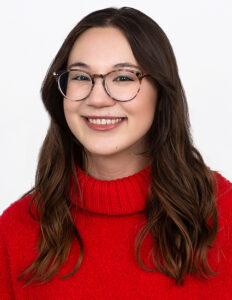
Eleni Katsarelas
Senior Enrollment Counselor
